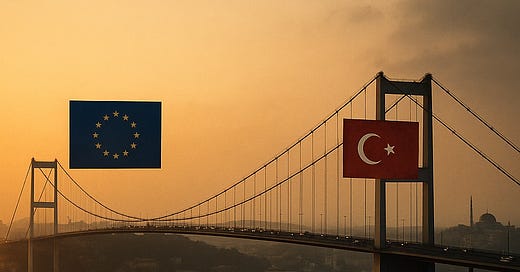Prospects for a ‘Torn’ Turkey: A Secular and Unitary Future?
By Svante E. Cornell, Halil Magnus Karaveli
Published in October 2008.
Introduction.
In 2008, the Turkish republic celebrates its eighty-fifth anniversary. It will also commemorate the seventieth anniversary of the death of the founder of the republic, Mustafa Kemal Atatürk (1881-1938). These are symbolically charged anniversaries. They coincide with a defining moment in the history of the Turkish republic; traditional republican notions about the nation-state and the role of religion in society are in the process of being redefined and renegotiated. Severe ideological tensions between competing power centers in the state apparatus as well as in a civil society, which is divided along ideological lines, have ensued.
In 2007 and 2008, Turkey was shaken by a regime crisis in which the Islamic conservatives, in government since 2002, were pitted against a secular opposition in other parts of the state establishment, mainly the military and parts of the judiciary. The decision of the constitutional court in the summer of 2008 not to follow the republic’s chief prosecutor’s demand to ban the Justice and development party, the AKP, marked the end of the acute crisis, although not of the age-old struggle over the identity of Turkey. Indeed, the contentious issues remain as unresolved as ever.
The secularist opposition had suffered a resounding defeat in the elections of 2007 when the AKP was re-elected with 47 percent of the votes. Subsequently, for the first time in the history of the republic, the military failed in its attempts to steer politics: Abdullah Gül became the first person of an Islamist background to be elected Turkish president, over the military’s objections, and the General staff has since had to acquiesce in the continuation of the AKP’s rule as well.
Internal as well as external dynamics underpin the power of the Islamic conservatives. The broader Islamic movement – not least the religious brotherhoods that constitute the societal base of religious conservatism – wields significant power over education, media, and the economy, and is entrenched in the state bureaucracy. Indeed, the AKP has come close to realizing its goal of controlling the state.
The Islamic conservative government enjoys broad international support. The attractiveness of the AKP, an Islamic-rooted party that embraces the West – aiming for EU membership and nurturing close relations with the United States – is understandable. It is an alternative that offers hope, disclaiming, so it seems, the notion of the inevitability of a clash of civilizations between the West and Islam.
A “Muslim democracy” is assumed to be in the making, replacing the old republican, secularist model installed by Atatürk’s revolution in 1923. That model is currently held in low esteem in political as well as intellectual circles in the West. Kemalism, the ideology attributed to Kemal Atatürk but often perverted by his successors, stands accused of being authoritarian, of having inflicted a psychological trauma on Turkish society by imposing secularism and of having created a nation-state that has violated ethnic diversity. With the abandonment of the Kemalist model, by which greater, societal room is made for religion and for multi-ethnicity, a process of “psychological and cultural healing process” is assumed to have been ushered in.
While the Islamic conservatives have adopted a pro-western discourse, the traditionally Western-oriented secularists, notably the social democrats, have confused and repelled observers in the United States and in Europe by their recent conversion to a vehemently anti-western neo-nationalism. In fact, the confusion and repulsion is reciprocal; the secularists have been disoriented by the Western liberals’ support for Islamic conservatism.
From a Western policy perspective, there are two basic questions to be asked about Turkey: To what degree is the assumption that guides U.S. and European policy towards Turkey about the Islamic conservatives – that they are a force for reform that will make Turkish society more democratic, securing Turkey as a Western asset – warranted? And secondly, how are the forces of Kemalism/secularism to be conceptualized? In particular, how should the military be understood? Observers of Turkey generally take the armed forces’ commitment to secularism for granted; does it really run as deep as it is assumed?
The prevailing Western reading of Turkey suffers from a blind spot, of a refusal to fully acknowledge that the confrontation over secularism is a conflict of identities, not just a power struggle between “Muslim democrats” and “authoritarian secularists”. The existential divides of Turkish society – between seculars and religious conservatives, as well as the one between Turks and Kurds – are far from being bridged any time soon. Quite to the contrary, the divisions run deeper than ever. Alongside with the confrontation over secularism, ethnic polarization is sharpening. Recent upheavals are of a kind to raise doubts about the basic viability of Atatürk’s republic. Was it stillborn, or does it merely suffer from neglect? Needless to say, how its history is interpreted will make a great difference for the future evolution of the republic.
Looking a decade or so ahead, what kind of a Turkey can we expect? In particular, what are the implications of religious conservatism and secularism respectively for democratization and for Turkey’s foreign policy orientations? While trying to fathom what the future may hold, how the republic that will be celebrating its 100th anniversary in 2023 may come to look like, this study will also take stock, in rough outline, of the Kemalist experiment. How that historical experiment is ultimately judged has an importance that transcends the borders of Turkey.
Click here to continue reading Prospects for a ‘Torn’ Turkey: A Secular and Unitary Future?.




